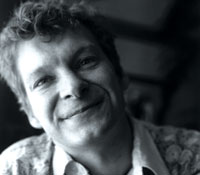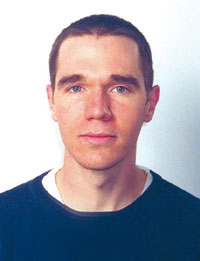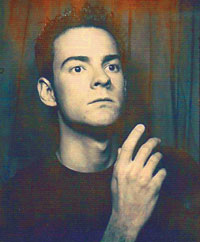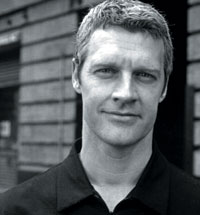25 NEW FACES OF INDEPENDENT FILM 2002
 |
GARRETT SCOTT had intended to become an English professor while at University of Wisconsin grad school when a bizarre event occurred in his hometown of San Diego. A local man stole an Army tank from a nearby base and went on a joyride through a city suburb, destroying cars, fire hydrants and traffic poles. Shawn Nelson – a crystal-meth user who had previously embarked on a delusional search for gold by mining his backyard – envisioned the act as a protest against an uncaring city government. But, after a 30-minute chase, police boarded the tank and shot Nelson dead.
For Scott, 33, the event was the catalyst that pulled him from academia and transformed him into a filmmaker. "I was having doubts about an academic career," he says. "Then, when this guy stole the tank, something just clicked."
What clicked was Scott’s unique doc-style, which is one-part subcultural talking head and two parts intellectual essay. Intercut with hypnotic helicopter footage of the man’s carnage-filled ride – footage that evokes both video games as well as television’s predilection for slow-speed chases – Scott’s superb and smart one-hour doc, Cul de Sac, provides personal insights from the man’s family and neighbors, explains San Diego’s reputation as the crystal-meth capital of the U.S., and finally develops into a surprisingly moving essay on the dialectic between the American dream and the military industrial complex.
Of his style, Scott comments, "I’m very interested in the way abstractions of history and geography affect people’s immediate world, how they dovetail with the personal. Many of us are acting things out that we can’t comprehend, and to catch little glimpses of that once in a while seems like a worthwhile project."
Cul de Sac premiered at the New York Underground Film Festival this past spring, but, for now, Scott is back to waiting tables for a living. Although he has a follow-up project ("I’ll be re-examining the Harvey Milk murder by looking at it as an event in the history and geography of San Francisco") Scott says he’s hesitant to call himself a full-time filmmaker. "I’m suspicious of careers because you have to produce a certain kind of product to sustain one, whether its film or academia," he remarks. "But I think I can hustle myself through one more project." – Scott Macaulay
Contact: gsub@mindspring.com
 |
FEARING THE CELLULOID output of cinematic structuralists and artisanal avant-gardists, industry fest-goers customarily skip films playing in experimental sidebars like Sundance’s Frontier section. But this year, those executives made a big mistake if they missed Soft for Digging, J.T. Petty’s ingeniously scary no-budget horror film. At just $6,000 to picture cut, Petty’s film may have been inspired by silent cinema like D.W. Griffith’s Broken Blossoms, but its schizoid in-camera effects and precise mise-en-scène demonstrates a filmmaker capable of scaring away tired horror-movie formulas. Shooting with a tiny crew on a 2:1 ratio, Petty made his NYU thesis film into more than a calling card – after its Sundance premiere, the film has played numerous festivals and sales are pending with several foreign distributors.
Currently, Petty is working off other fruits of Sundance, specifically, a deal to write the third installment of Dimension’s Mimic series. And while the virtually talk-free Soft for Digging may not sell Petty’s way with dialogue, that skill is evidenced by his day job. For the past three years he has written the screenplays for videogames like Batman: Vengeance and Tarzan Untamed for Canadian software company Ubi Soft. "Writing games has gotten me better with dialogue and characters," comments Petty. "It’s a challenge to make something [a player must] interact with feel alive."
After Mimic 3, Petty hopes to direct a "sexy, violent comedy" called Skin and Teeth, based on his own original screenplay. But first, he has one more premiere: He’s the sole author of Ubi Soft’s latest, Tom Clancy’s Splintercell, forthcoming for Playstation 2. – Scott Macaulay
Contact: David Kopple, The Gersh Agency (310) 205-5888.
 |
DECO DAWSON is running from the room after a screening of his enthrallingly peculiar fifth short, FILM(dzama). There are a few frames where B&W has been rendered as sepia in this surreal fictional biography of the young, internationally honored visual artist Marcel Dzama, in which his inner life is portrayed by his own father. ("He’ll age into the role of himself," dawson jokes.)
The relentless dawson doesn’t want to answer questions in front of this hometown Winnipeg audience; he wants to get on the horn to the film lab and give them a piece of his mind. The filmmaker’s career is progressing on two paths: often hand-processed and tinted works like this frenetic gem, and collaborations with fellow prairie anachronist Guy Maddin.
dawson produced 13 plays in Winnipeg before meeting Maddin in a bookstore. Maddin had seen one of dawson’s plays, A Silent Act, a silent, 45-minute, choreographed slapstick/vaudeville stage piece done to improvised Joplin ragtime. Maddin loved the piece – "I mean, slapstick vaudeville, who is doing that kind of stuff?" dawson says, laughing – and they hit it off immediately. "Having just completed the ‘less then monumental’ Twilight of the Ice Nymphs, Guy was really in the need for some youthful revitalization," dawson says.
After taking Maddin’s film class, dawson worked as co-cinematographer and co-editor of Maddin’s magnificent seven-minute fever dream, The Heart of the World. In 2002, Dawson edited and co-directed with Maddin the relentlessly jaw-dropping ballet film, Dracula: Pages from a Virgin’s Diary.
While similar in its Byzantine barrage of influences to Maddin’s sweetly peculiar work, dawson comes from a theater background, having produced 13 plays before making shorts, and citing influences such as Beckett, Robert Wilson, Robert LePage and the "completely enthralling" writing of Peter Brook. But, of his greatest influence, he says, "I am a huge fan of vaudeville, which led to my love of silent cinema. Essentially anything inter-war is fantastic. Something happened to art in 1918; it became so aggressive, resulting in cubism, futurism, surrealism, expressionism and then, well, the musical film, as surrealist escapist as you can get."
Along with a handful of shorts, he’s preparing his first solo feature, The Broadway of Fejos, based on Hungarian-born filmmaker Dr. Paul Fejos’s 1928 Hollywood crime musical, Broadway. dawson’s film will be a fictional "making of" told in the style of backstage musicals of the era. Like Maddin, he’s working toward "an awkward blend of silent film and early talkies" and will mingle "repioneered" two-strip Technicolor style for music numbers. He says Winnipeg remains a fount of inspiration. "I’ve lived in Winnipeg my entire life, and, as of yet, have no ambition to move away. There are no superstars in Winnipeg. You can live, work and produce in Winnipeg without ever getting praise from other Winnipeggers. It’s very humbling." – Ray Pride
Contact: decodawson@shaw.ca
 |
| PHOTO: MIGUEL VILLALOBOS |
BORN AND RAISED in Wyoming, Dan Junge had known about the Wyoming Indian High School basketball team which would become the subject of his award-winning debut documentary, Chiefs, since high school.
"I played high school basketball in Wyoming, "says Junge. "Actually, I sat on the bench – so ‘played’ is kind of a misnomer. I watched plenty of basketball in high school, and we knew about the Chiefs, although we didn’t play them. We didn’t want to play them – because it was a losing proposition anyway you looked at it."
After taking a course with Sydney Pollack at Colorado College as an undergrad, he became convinced he wanted to be a filmmaker. He transfered to NYU film school but returned to Colorado College to graduate. His 1993 thesis film, Road Movie, "about a boy who thinks he’s a rebel until he meets a girl who’s a real rebel and finds out he doesn’t have what it takes," screened at the Denver and New Orleans film festivals.
After college, Junge worked in the film industry in L.A. and N.Y. on a variety of independent productions. He also moved briefly to South America and then to London, where he worked as a researcher for the BBC. Throughout this period, Junge says, "I was turning out proposal after proposal for films with ‘American ideas,’ and then I finally realized that the best idea was right in my own backyard. It was Chiefs."
He settled in Denver, co-founded a non-profit organization, Just Media, with a producing partner, Henry Ansbacher, and contacted Donna Dewey, who won an Academy Award for documentary short subject in 1997, for whom he had schlepped coffee at one point. "Between the three of us," says Junge, "we were able to move forward and shoot the first of what became two years of principal photography [on Chiefs], beginning in 1999."
On the basis of a trailer, the film was fully funded by ITVS. Chiefs premiered at the inaugural Tribeca Film Festival, where it won Best Documentary, and has since been invited to numerous other fests.
Junge and Ansbacher are now developing several other documentary projects, all on spec, and all with interest from different broadcast entities. Among these are: American Buddha, about an American teenager living in Florida coming to grips with the fact that he has been recognized as a reincarnated Tibetan Buddhist holy man; Cancer Cowboys, which follows three Ph.D.s researching alternative cancer therapies; a film about the Physically Handicapped Amateur Actors League, and a film on a First Amendment—rights Supreme Court case in Colorado.
Although he’s found success with documentaries, Junge is quick to add, "The idea of doing narrative features has also been rekindled." – Steve Gallagher
Contact: jungman@earthlink.net
 |
AS ANY filmmaker knows, reality is the hardest thing to fake. While so many films cover up unmotivated characters and phony decor with a stylistic sucker punch, the most striking displays of new talent are often those pics that deceptively keep their solid craft beneath the viewer’s perception.
Take, for example, Interview with the Assassin, Neil Burger’s debut feature that will be released this fall by Magnolia Pictures. Working the "mock-doc" genre, Interview steers clear of Guffman-like caricature and instead dramatizes an entirely possible "what-if" – that a second J.F.K. shooter is out there to be found by a lone reporter/cameraman.
"The [documentary format] buys you certain things [as a fiction filmmaker]," says Burger, "but it’s also an incredible challenge. If it’s going to feel ‘true,’ you’ll only be able to see what this cameraman would reasonably be shooting. That was challenging – how do you construct a three-minute take so that it’s dramatic, suspenseful and tense?" With a transfixing performance by Raymond J. Barry and elegant lensing by Richard Rutkowski, the film achieves a dramatic tension while artfully maintaining its illusion of verisimilitude.
Burger, a Yale fine arts graduate, made experimental films in New York in the late ’80s before creating the "Books: Feed Your Head" spots for MTV. Those led to a career as a commercial director. Interview got made when Burger happened to meet writer/directors Brian Koppelman and David Levine (Knockaround Guys), who loved the script and offered to produce. The two are producing Burger’s next script, The Illusionist, an adaptation of Steven Millhauser’s short story. – Scott Macaulay
Contact: Spencer Baumgarten, Endeavor, (310) 248-3000.
VOD CALENDAR


 See the VOD Calendar →
See the VOD Calendar →


